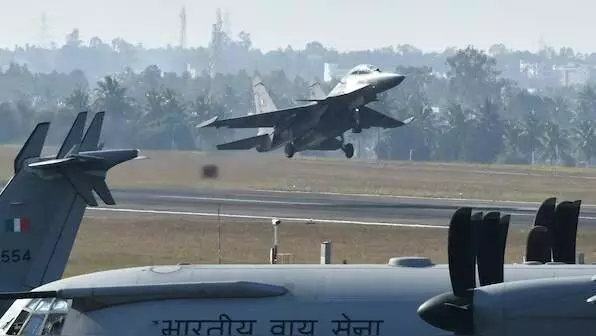India Lost Fighter Jets in Operation Sindoor Due to Political Directive Not to Target Pakistani Military, Says Navy Official
India lost jets in Op Sindoor due to early political orders limiting strikes to terror camps, not Pakistani military targets, says Navy official.
image for illustrative purpose

India suffered the loss of several fighter jets during the initial phase of Operation Sindoor due to political directives that restricted the military from striking Pakistani military targets, a senior Navy officer has revealed.
Captain Shiv Kumar, India’s Defence Attaché to Indonesia, made the comments during a seminar in Jakarta on June 10. His remarks have only recently come to light and were not previously reported in the media.
Responding to claims by an Indonesian aerospace expert that the Indian Air Force lost five aircraft—three Rafale jets, one MiG-29, one Sukhoi-30—and a tactical drone, Captain Kumar acknowledged losses but challenged the exact numbers.
Political Constraints Limited Early Military Response
“I may not agree with him that India lost so many aircraft. But I do agree that we did lose some, and that happened only because of the constraint given by the political leadership—not to attack military establishments and air defences,” Kumar said during the event, titled Analysis of the Pakistan-India Air Battle and Indonesia’s Anticipatory Strategies from the Perspective of Air Power.
Operation Sindoor was launched in response to a deadly terrorist attack in Pahalgam on April 22, in which 26 people, including many tourists, were killed by Pakistan-backed militants.
Tactical Shift Brought Air Superiority
Kumar explained that after the initial losses, India revised its strategy to include attacks on Pakistani military installations. “We shifted focus to achieve suppression and destruction of enemy air defences—known in military terms as SEAD and DEAD—which enabled our forces to operate with greater effectiveness,” he said.
He added that by May 8–10, India had established full air superiority over Pakistani airspace.
Official Silence and Embassy Clarification
The Indian Ministry of Defence has declined to comment on Captain Kumar’s remarks. However, the Indian Embassy in Jakarta issued a statement distancing itself from the interpretation of his comments.
“The media reports misrepresented the purpose and focus of the presentation,” the embassy stated. “Captain Kumar emphasized that the Indian Armed Forces operate under civilian political leadership. The objective of Operation Sindoor was to dismantle terrorist infrastructure, not to escalate military conflict.”
Earlier Statement by CDS General Chauhan
Kumar’s remarks follow a previous statement by Chief of Defence Staff General Anil Chauhan. Speaking in Singapore on May 31, General Chauhan attributed the loss of aircraft on May 7 to tactical missteps, which he said were promptly corrected. He confirmed that the Indian Air Force subsequently carried out precision strikes deeper into Pakistani territory after neutralizing its air defences.
Despite these disclosures by high-ranking officials, the Indian government has yet to issue an official account of the aircraft losses during Operation Sindoor.

